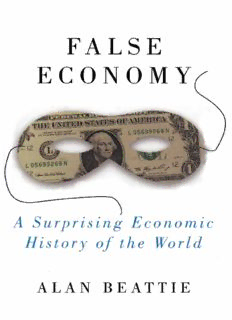
False Economy: A Surprising Economic History of the World PDF
Preview False Economy: A Surprising Economic History of the World
F A L SE E C O N O MY A L AN B E A T T IE $26.95 Why do some economies and societies crash and burn, while others are buffeted by storms and yet still recover? Can we analyze the fates of countries in a way that will help us analyze the fault lines and successes that can make or break a civiliza tion, a city, or a culture? In False Economy, Alan Beattie weaves together elements of eco nomics, history, politics, and human stories, revealing that governments and countries make concrete choices that determine their destinies. He opens larger questions about the choices countries make, why they make them or are driven to make them, and what these choices can mean for the future of our global economy as we go forward into uncharted territory. Economic history involves forcing together disciplines that fall naturally in different di rections, the universal explanation versus the individual narrative. But Beattie has written a lively and lucid book that engagingly and thought-provokingly marries the two disciplines and reveals their interdependence. Along the way, you'll discover why Africa doesn't grow cocaine, why our asparagus comes from Peru, why your keyboard spells QWERTY, and why giant pandas are living on borrowed time. . . . Beattie uses extraordinary stories of eco nomic triumph and disaster to explain how some countries have gone wrong while oth ers have gone right, and why it's so difficult to change course once you're on the path to ruin. 0904 ALAN BEATTIE graduated from Balliol College, Oxford, with a degree in history. After taking a master's degree in economics at Cam bridge, he worked as an economist at the Bank of England and then joined the Financial Times in 1998. Currently the paper's world trade edi tor, he writes about economics, globalization, and development. Jacket design O 2009 Keenan Photograph of the author O Financial Times/Charlie Bibby Visit our website at: www.riverheadbooks.com RlVERHEAQ a member of Penguin Group (USA) Inc. BOOKS 7 www.penguin.com "In this fascinating and insightful hook. Alan Beattie brilliantly illustrates how countries* choices determine and. in some cases, sadly undermine their prospects for generations. This masterly global economic journey is a must read for all those keen to understand how today's surge in state activ ism will impact national and international futures." —MOHAMED A. EL-ERIAN CEOofPIMCOand author of When Markets Collide "Beattie's analytics show facts can be a force for change. Give people the facts, and they'll do the right thing." — BONO lead singer of U2 and cofounder of the antipoverty organization ONE "This is a wonderfully liberating book. Alan Beattie flies in the face of one of the most dearly held ideas in the social sciences: that today's economic outcomes—which countries are rich, and which remain poor—have deep and largely immutable roots in history, geography, or culture. Beattie's narrative shows that there is plenty of room for choices, and that history rewards those governments that make the correct ones." — DAN! RODRTK professor of international political economy, John F. Kennedy School of Government, Harvard University ISBN 978-1-59448-866-5 FALSE ECONOMY F A L SE ECONOMY A SURPRISING ECONOMIC HISTORY OF THE WORLD ALAN BEATTIE RIVERHEAD BOOKS a member of Penguin Group (USA) Inc. New York 2009 RIVERHEAD BOOKS Published by the Penguin Group Penguin Group (USA) Inc., 375 Hudson Street, New York, New York 10014, USA • Penguin Group (Canada), 90 Eglinton Avenue East, Suite 700, Toronto, Ontario M4P 2Y3, Canada (a division of Pearson Canada Inc.) * Penguin Books Ltd, 80 Strand, London WC2R 0RL, England * Penguin Ireland, 25 St Stephen s Green, Dublin 2, Ireland (a division of Penguin Books Ltd) * Penguin Group (Australia), 250 Camberwell Road, Camberwell, Victoria 3124, Australia (a division of Pearson Australia Group Pty Ltd) * Penguin Books India Pvt Ltd, 11 Community Center, Panchsheel Park, New Delhi-110 017, India * Penguin Group (NZ), 67 Apollo Drive, Rosedale, North Shore 0632, New Zealand (a division of Pearson New Zealand Ltd) * Penguin Books (South Africa) (Pty) Ltd, 24 Sturdee Avenue, Rosebank, Johannesburg 2196, South Africa Penguin Books Ltd, Registered Offices: 80 Strand, London WC2R 0RL, England Copyright © 2009 by Alan Beattie All rights reserved. No part of this book may be reproduced, scanned, or distributed in any printed or electronic form without permission. Please do not participate in or encourage piracy of copyrighted materials in violation of the author's rights. Purchase only authorized editions. Published simultaneously in Canada The lines from Tony Harrison's The Blasphemers' Banquet are quoted from Collected Film Poetry (Faber & Faber, 2007). Library of Congress Cataloging-in-Publication Data Beattie, Alan. False economy / Alan Beattie. p. cm. Includes bibliographical references and index. ISBN 978-1-59448-866-5 1. Economic history. 2. Economics. I. Title. HC51.B377 2009 2009005885 330.9—dc22 Printed in the United States of America 1 3 5 79 10 8 6 42 Book design by Meighan Cavanaugh While the author has made every effort to provide accurate telephone numbers and Internet addresses at the time of publication, neither the publisher nor the author assumes any responsibility for errors, or for changes that occur after publication. Further, the publisher does not have any control over and does not assume any responsibility for author or third-party websites or their content. To my parents
Description: